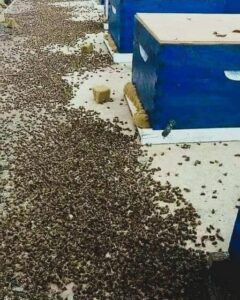Thousands of bees lie lifeless in open fields, victims of pesticides sprayed without caution or conscience. Their small bodies — once buzzing with purpose — now fall silent, a chilling sign of how carelessly we treat the very creatures that help sustain our world. Most people don’t realize it yet, but with every bee that dies, we inch closer to a devastating collapse of the life cycle we depend on. What seems like a distant environmental issue is, in fact, a direct threat to human survival.
Bees are far more than honey makers. They are essential pollinators responsible for fertilizing the majority of the fruits, vegetables, seeds, and nuts we consume daily. Without bees, many of the foods we take for granted would simply cease to exist. And it’s not just about food — bees also support the growth of trees, flowers, and other plants that serve as food and shelter for countless living beings. Their role in preserving biodiversity is unmatched.

It’s no exaggeration to say that bees are the foundation of life on Earth. That’s why the Earthwatch Institute, during a Royal Geographical Society meeting in London, declared bees to be the most important living creatures on the planet. But that announcement came with a grim warning: bees are now on the brink of extinction. The main causes include pesticide overuse, deforestation, air pollution, climate change, and the spread of diseases through invasive species. As the world races forward in industrial expansion, bees are quietly dying in the background — and with them, so is our future.
One of the most quoted statements on this topic, often attributed to Albert Einstein, still echoes with terrifying clarity: “If bees were to disappear from the Earth, humans would have no more than four years to live.” While some may debate the origin of that quote, the science behind it is clear. Without bees, the food chain breaks. Crop yields will drastically drop, prices will skyrocket, and global hunger will rise. Entire ecosystems will collapse. Even the air we breathe would be affected, as fewer plants mean less oxygen production. The disappearance of bees wouldn’t just be an ecological disaster — it would be a humanitarian one.
But we are not helpless. There is still time to reverse the damage, if only we act now. We can begin by banning harmful pesticides that decimate bee populations. Supporting organic farming, planting wildflowers and bee-friendly gardens, and reducing our use of chemicals in daily life can also make a meaningful difference. Buying honey from ethical, small-scale beekeepers and spreading awareness about the importance of bees are small but powerful steps toward change. Even the smallest action can contribute to a larger movement.
Bees ask for so little — a safe environment, clean air, and blooming flowers. In return, they give us life. If we continue to destroy their world, we destroy our own. The hum of bees is not just background noise on a summer afternoon; it’s the sound of nature working as it should. Let’s not wait until that sound disappears forever. Let’s protect the pollinators that help the world bloom.


